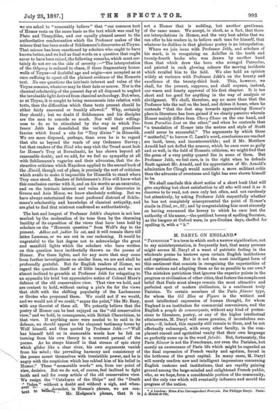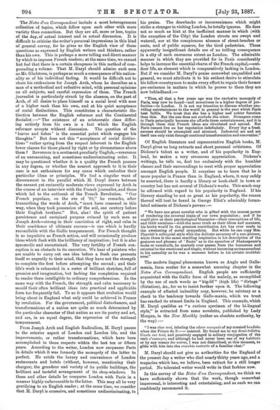M. DARYL ON ENGLAND.*
" PATRIOTISK " is a term to which such a narrow signification, not to say misinterpretation, is frequently lent, that many persons might accuse M. Daryl of a want of patriotic feeling in the wholesale praise he bestows upon certain English institutions and organisations. But is it not the most intelligent form of this sentiment that consists in recognising the superiorities of other nations and adapting them as far as possible to our own? The mistaken patriotism that ignores the superior points in the progress or civilisation of other cities, that fosters the complacent belief that Paris must always remain the most attractive and perfected spot of modern civilisation, is a sentiment truly Parisian. To certain members of the Paris fltineur type, for whom the Gil Blas or Figaro is the wittiest and most intellectual expression of human thought, for whom England is an institution for commercial convenience, and the English a pelvic de commercants, without any kind of preten- sions to literature, poetry, or any of the higher intellectual attainments, M. Daryl will cause genuine, if incredulous sur- prise,—if, indeed, this capacity still remain to them, and be not effectually submerged, with every other faculty, in the com- placent conceit and egotistical vanity that their own language so perfectly sums up in the word fatuite. But, fortunately, the Paris frineur is not the Frenchman, nor even the Parisian, but merely an excrescence of Paris life which might be regarded as the final expression of French vanity and egotism, forced in the hothouse of the great capital. In many cases, M. Daryl will merely confirm new and intelligent impressions concerning English customs and institutions, that are rapidly gaining ground among the large-minded and enlightened French public, who, as we hope, form a considerable portion of the community, and the only one which will eventually influence and mould the progress of the nation.
• A Londrou Not. d'art Correspondent Franteia. Par Philippe Daryl. Paris J. Itetael et Cie.
The Notes d'un Correspondant include a most heterogeneous collection of topics, which follow upon each other with more variety than connection. Bat they are all, more or less, topics of the day, of actual interest and in actual discussion. It is difficult to criticise the writer's personal impressions in this kind of general survey, for he gives us the English view of these -questions as expressed by English writers and thinkers, rather than his own. This is perhaps a more telling and direct manner by which to impress French readers; at the same time, we cannot but feel that there is a certain cheapness in this method of corn- pounding a volume. That M. Daryl should admire such men as Mr. Gladstone, is perhaps as much a consequence of his nation- ality as of his individual feeling. It would be difficult not to share his enthusiasm for Joseph Arch, whom he describes as a man of a methodical and reflective mind, with personal opinions on all subjects, and careful expression of them. The French journalist is particularly struck by the absence, on the part of Arch, of all desire to place himself on a social level with men of a higher rank than his own, and at his quiet acceptance of social distinctions. This constitutes a characteristic dis- tinction between the English reformer and the Continental Socialist :—" The existence of an aristocratic class differ- ing entirely from his own is a fact which the English reformer accepts without discussion. The question of the • loaves and fishes' is the essential point which engages his thoughts." But does not this " acceptance of social distinc- tions " rather spring from the respect inherent in the English lower classes for those placed by right or by circumstance above them ? Reverence is a sentiment peculiarly English,—reverence of an unreasoning, and sometimes undiscriminating order. It may be questioned whether it is a quality the French possess in any degree, or whether the nearest approach to it in their case is not enthusiasm for any cause which embodies their particular ideas or principles. We find a singular want of discernment in the parallel which M. Daryl draws between the earnest yet eminently moderate views expressed by Arch in the course of an interview with the French journalist, and those which led to the outbreak of the French Revolution. " Our French populace, on the eve of '89," he remarks, after transcribing the words of Arch, "must have reasoned in this way, when they took possession of the soil, one century before their English brothers." But, alas! the spirit of patient persistence and sustained purpose evinced by such men as Joseph Arch—strong in their conviction of right, and calm in their confidence of ultimate success—is one which is hardly reconcilable with the Gallic temperament. For French thought is as impulsive as French action, and will occasionally produce ideas which flash with the brilliancy of inspiration; but it is also spasmodic and unsustained. The very fertility of French con- ception is an obstacle to its execution. We hear of painters who are unable to carry out one idea before a fresh one presents itself so urgently to their mind, that they have not the strength to complete the first before attempting the second ; and their life's work is exhausted in a series of brilliant sketches, full of promise and imagination, but lacking the completion required to render them intelligible to ordinary comprehensions. In the same way with the French, the strength and calm necessary to mould their often brilliant ideas into practical and applicable form too frequently fail. To us it appears that evolution would bring about in England what only could be achieved in France by revolution. For the government, political disturbances, and transformations of a nation are quite as much determined by the particular character of that nation as are its poetry and art, and are, in an equal degree, the expression of the national temperament.
From Joseph Arch and English Radicalism, M. Daryl passes to the exterior aspect of London and London life, and the improvements, or rather transformations, which have been accomplished in these respects within the last ten or fifteen years. According to the writer, London now surpasses Paris in details which it was formerly the monopoly of the latter to perfect. He extols the luxury and convenience of London restaurants and hotels (without, however, mentioning their charges), the grandeur and variety of its public buildings, the brilliant and tasteful arrangement of its shop-windows. In these and other details be compares London with Paris in a manner highly unfavourable to the latter. This may all be very gratifying to an English reader ; at the same time, we consider that M. Daryl is excessive, and sometimes undiscriminating, in his praise. The drawbacks or inconveniences which might strike a stranger in visiting London, he totally ignores. He does not so much as hint at the inefficient manner in which (with the exception of the City) the London streets are swept and watered, nor at the conspicuous absence of street-benches or seats, and of public squares, for the tired pedestrian. These apparently insignificant details are of no trifling consequence in a city of such enormous extent as London. The admirable manner in whioh they are provided for in Paris considerably helps to increase the essential charm of the French capital,—ont- door life, an element which is comparatively lacking in London. But if we consider M. Daryl's praise somewhat unqualified and general, we mast attribute it to his evident desire to stimulate his fellow-countrymen to make every effort to regain their former pre-eminence in matters in which he proves to them they are now behindhand :—
" Thus, all that a few years ago was the exclusive monopoly of Paris, may now be found—and sometimes in a higher degree of per- fection—in London. It is not my intention to discuss whether pro- viding entertainment to the world in general is the part which Paris beet fulfils. We trust that she has a higher and nobler ¬ion than this. Bat the one does not exclude the other. Strangers come to Paris principally because she affords them entertainment, and it is through them that French ideas are circulated and spread. But Paris cannot live on her reputation indefinitely. Every day a fresh mimeos should be attempted and attained. Industrial art and art itself can only exist through continual transformation and renovation."
Of English literature and representative English hooks, M.
Daryl gives us long extracts and short personal criticisms. Of Dickens's talent as a writer, and of his popularity in Eng- land, he makes a very erroneous .appreciation. Dickens's writings, he tells us, deal too exclusively with the humbler classes and their surroundings to meet with proper appreciation amongst English people. It surprises us to learn that he is more popular in France than in England, where, it may safely be asserted, there is hardly a library or book-shelf in town or country but has not several of Dickens's works. This much may be affirmed with regard to his popularity in England. If his literary standing be not so great as hie popularity, the reason
thereof will best be found in George Eliot's admirably formu- lated estimate of Dickens's powers :—
" We have one great novelist who is gifted with the utmost power of rendering the external traits of our town population; and if he could give us their psychological character—their conceptions of life, and their emotions—with the same truth as their idiom and manners, his books would be the greatest contribution Art has ever made to the awakening of social sympathies. But while he can copy Mrs. P]ornish'a colloquial style with the delicate accuracy of a enn-picture, while there is the same startling inspiration in his description of the gestures and phrases of ' Boots as in the speeches of Shakespeare's mobs or numskulls, he scarcely ever passes from the humorous and external to the emotional and tragic, without becoming as transcendent in his unreality as he was a moment before in his artistic truthful-
nese."
The modern lingual phenomena known as Anglo and Gallo-
mania, form matter for a somewhat amusing chapter in the Notes d'un Correspondent. English people are sufficiently acquainted with the Gallic form of the malady, as exemplified by the use of such words as " hig-lif " (high life) " fiirtage " (flirtation), e6c., for us to insist further upon it. The following example of affected imbecility may, however, be salutary as a check to the tendency towards Gallo-mania, which we trust
has reached its utmost limits in England. This example, which M. Daryl qualifies as "a curious specimen of the bi-lingual style," is extracted from some novelette, published by Lady Morgan, in the New Monthly (rather an obsolete authority, by the way) :—
"Iwas chez moi, inhaling the odour mussude of my scented boudoir, when the Prince de Z— entered. He found me in my demidoilotte, him& sur tout, and pensively engaged in solitary conjugation of the verb s'ennuyer, and although he had never been one of my habitues or by any means des nob-so, I was not disinclined, at this moment, to glide with him into the crocchio restretto of a familiar chat."
M. Daryl should not give as authorities for the England of the present day a writer who died nearly thirty years ago, and a magazine which has, we believe, been extinct for a still longer period. No tolerated writer would write in that fashion now.
In this survey of the Notes d'un Correspondant, we think we have sufficiently shown that the work, though somewhat impersonal, is interesting and entertaining, and as such we can confidently recommend it.



































 Previous page
Previous page